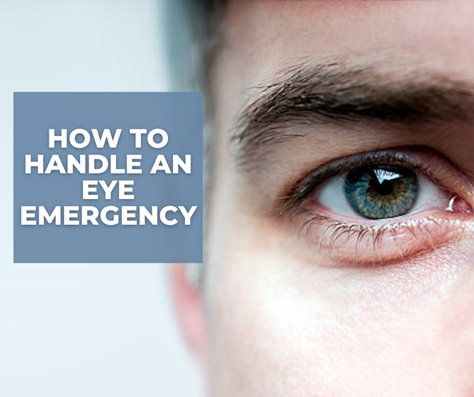Home » Blog » What To Do If You Have An Eye Emergency
What To Do If You Have An Eye Emergency
Posted by: Georgia Eye Associates in General

Whether playing a sport, cleaning the house using chemical agents, doing lawn care, or just opening a bottle of champagne to celebrate a special moment, our eyes are exposed to many daily dangers. The curved shape of the eye protects the eye and can also be the target of trauma. All it takes is a quick accident for the eye to be injured.
What Is an Eye Emergency?
An eye emergency can happen due to a shock, a foreign object, or a chemical product. Any eye injury should always be taken seriously. A consultation with your eye doctor is necessary because pain alone is not always enough to assess the urgency.
What Are Some Causes of an Eye Emergency?
- Cuts and Scratches: Rubbing the eye when a foreign object lodges itself or getting poked in the eye with a sharp object can result in scratches or cuts.
- Chemical Injury to the Eye: Liquids, chemical powders, aerosols, or gases can enter the eye during daily activities and, if not treated, can affect vision.
- A Foreign Object in the Eye: The eye is exposed to foreign objects at work and play. Sharp particles, including metal, wood, or tool fragments, can enter the eye and cause an eye emergency.
- Trauma: A sudden accident related to a sports injury can lead to bleeding under the skin, which causes a black eye, which demands immediate care and attention to the cornea.
First Aid Treatment for Eye Injuries
Try to keep the person affected calm, and don’t panic! Here are a few steps before you reach out to your eye doctor or seek emergency care:
Chemical Burns and Splashes in the Eye:
- Tilt the person’s face down and sideways. Flush the eye with fresh water.
- Hold the person’s face under a sink or shower to flush both eyes if both eyes are affected.
- Allow the running water to rinse the eye(s) for 15-20 minutes.
- If the person is wearing contact lenses, try removing the contact lens after rinsing the chemical out from the eye(s).
- Look for information on the chemical that got into the eye, as some chemicals cause more eye damage than others.
- Seek emergency medical treatment right away!
If Your Eye Has Been Cut or Punctured
- Gently place a shield (protective cover) over the eye. The bottom of a paper cup taped to the bones surrounding the eye can serve as a shield until you get medical attention.
- DO NOT press the shield against the eye.
- DO NOT rinse with water.
- DO NOT remove any objects that are stuck in the eye.
- DO NOT rub or apply pressure to the eye.
- DO NOT take aspirin, ibuprofen, or other non-steroidal, anti-inflammatory drugs. These drugs thin the blood and may increase bleeding.
- After you have finished protecting the eye, get emergency medical help.
For All Other Eye Injuries
Injuries other than grit in the eye or minor scratches to the eye should be considered potentially serious.
- DO NOT touch, rub, or apply pressure to the eye.
- DO NOT try to remove any objects stuck in the eye.
- Do not apply ointment or medication to the eye.
- Over-the-counter eye drops can be more painful or make the injury worse.
- Prescription medications should only be used for precisely the prescribed condition, not for emergency treatment.
- See a doctor as soon as possible.
- If you can’t get to an eye doctor immediately, go to the emergency room.
Prevention
Always wear protective eye gear when playing sports, cleaning with toxic chemicals, or using power tools.
Be cautious and keep your eyes healthy! If you are experiencing any changes in your eyesight, contact us TODAY!

References: American Academy of Ophthalmology and American Optometric Association
The content is researched and vetted by the American Academy of Ophthalmology and the American Optometric Association. This blog provides information and discussion about eye health and related subjects. The content provided within this blog and any linked materials are not intended and should not be considered medical advice. If the reader or any person has a medical concern, they should consult with an appropriately licensed physician.
